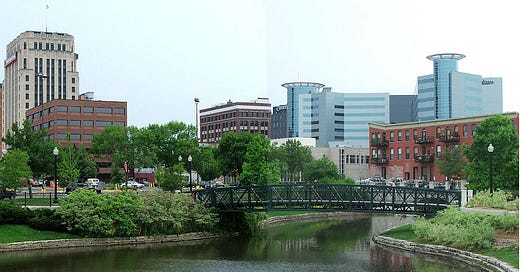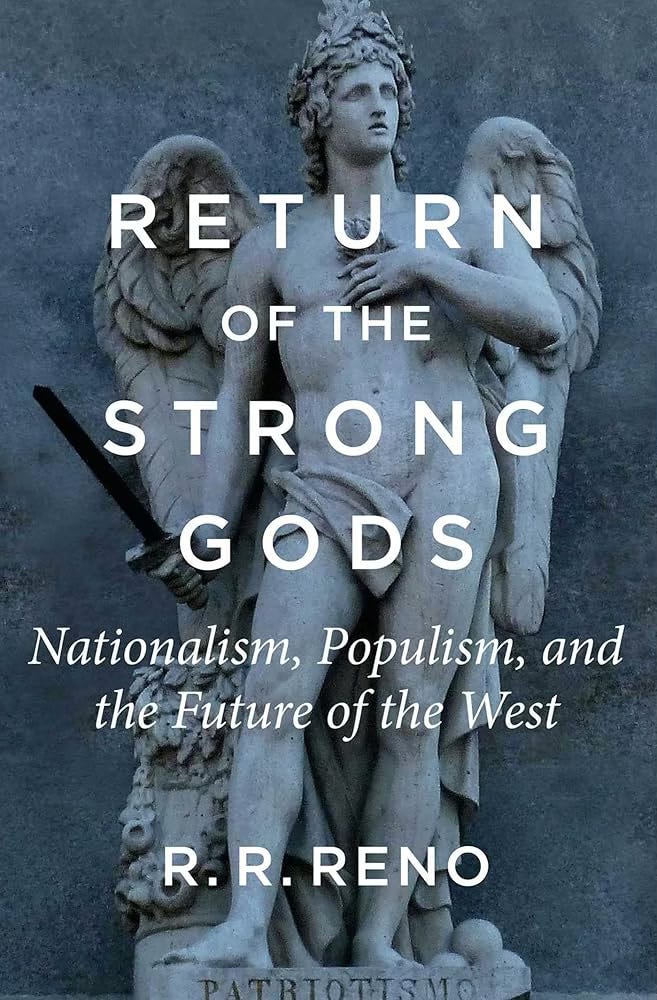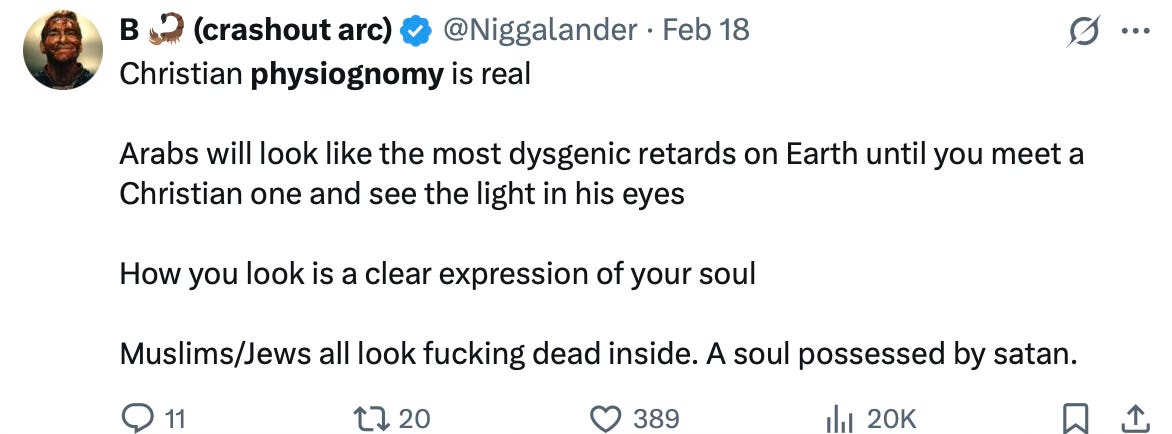I Was a Gal in Kalamazoo
It's a real place, and it taught me an important lesson for our current moment.
“A-B-C-D-E-F-G-H-I got a gal, in Kalamazoo! Don’t like to boast, but I know she’s the toast of Kalamazoo-zoo-zoo-zoo-zoo. Years have gone by. My, my how she grew!”
I’m sure many have heard this song by Glenn Miller and his band, but did you know that I came of age in Kalamazoo, MI? Most people don’t know it’s a real place, but it’s as real as any other funny-sounding place like Chicago or Minneapolis. It’s home to Western Michigan University and several colleges. It’s bursting at the seams with music and the arts: The Stulberg International String Festival where a young Joshua Bell distinguished himself as a violinist many years ago, the Gilmore Piano Festival, the Kalamazoo Symphony Orchestra, the Bach Festival, and private music studios galore. I am fond of it for its beauty, its old cemeteries that stretch out over rolling hills, its beautiful old churches and neighborhoods that I would wander for hours, and those five dollar seats way up high in Miller Auditorium where I would fill my ears with the symphonic classics.
Kalamazoo is also home to the Fetzer Institute. Not many people know about the Fetzer Institute, either, except for those who take the time to go down the rabbit hole of the oldest religion in the world, hermetic gnosticism. And hermetic gnosticism is tied up closely with the Hegelian dialectic and Marxist thought. Those who know what the Fetzer Institute promotes understand that it is probably one of the most subversive organizations in the United States. So subversive, that I’m not even sure some of the people who work for it understand that they’re being subversive.
This is the seed bed in which I grew up. The most significant, formative years were spent here.
Hang on to that thought, because the story of my time there will continue shortly.
For a moment, contemplate four words with me:
Loves and hates, building and demolition.
I’ve been pondering this idea a good bit the last few weeks. Do I talk about what I hate more than what I love? If so, that needs to change. I’ve also been thinking about a related idea:
The destruction of bad things doesn’t lead to good outcomes by default. You must be building good things simultaneously. And you better be darn tootin’ sure that what you’re destroying is actually a bad thing.
I have a theory that the people who mostly talk about what they hate have a lot in common with the people who like to take wrecking balls to the things they hate, be they ever so deserving of that hatred. Then comes the problem of what you love. The problem is that if you have more things that you hate than you love, and if you love the wrong things or love the right things inordinately, you won’t build anything beautiful and you will end with a pile of rubble.
I read a really great piece a couple weeks ago by Noah Smith which got me going down this train of thought. It’s called This Thing Will Fail: Trump will not restore the “strong gods” of community, family, and faith. I hope you’ll take the time to read it, because there was a lot more meat there than I can logistically quote for you here.
(The reference to “strong gods” is, I believe, a nod to this book by R.R. Reno called Return of the Strong Gods. You can buy it pretty much anywhere.)
From perusing Noah’s other pieces, I can tell that he and I would disagree on many political points. Regardless, he raises a valid warning. Trump will not give us the good, old days of strong communities, families and faith by simply tearing down the bureaucratic army of unelected petty tyrants.
I thought the following quote was particularly poignant:
The MAGA movement, you see, is an internet thing. It’s another vertical online community — a bunch of deracinated, atomized individuals, thinly connected across vast distances by the notional bonds of ideology and identity. There is nothing in it of family, community, or rootedness to a place. It’s a digital consumption good. It’s a subreddit. It is a fandom.
N.S. Lyons and the national conservatives have entirely misapprehended the cause of America’s abandonment of rootedness, community, family, and faith. We didn’t abandon those “strong gods” because liberals went too hard on old Adolf. We abandoned them because of technology.
And he’s right. Again, read the article, because he makes a compelling case, contrary to the dissident right that post World War II was an immediate rejection of those “strong gods.” On the contrary, family formation and church attendance and local civic engagement boomed for many years after WWII, and prior to that gave us the guts to whoop Hitler good and proper.
Don’t misunderstand me. I voted for Trump and I am pleased with many (not all) of the things he’s doing right now. The unelected bureaucratic army of petty tyrants needs to be stripped of all power. But Trump will not give us the good, old days of strong communities, families and faith by simply tearing down that unelected bureaucratic army of petty tyrants.
No, that has to be built by us by living the truth instead of lies. And it could have been built all these long years well before Trump arrived on the scene with his wrecking ball, but we were, as a society, much too lazy, much too addicted to ease and comfort, to do it.
Here, I will not abide any whining and complaining.
Because it was possible, even while our borders were being overrun, during inflation, while the public schools and the philosophies taught within their walls to impressionable young minds deteriorated into perversion.
Conditions were not ideal, but conditions throughout all of human history, have rarely been ideal.
The Right wants to blame subversion for this lack of building. “If only it weren’t for the Jews, or the CIA, or Mossad, or George Soros!”
But I am a Christian, and I know that no amount of subversion can trump the power of God when His people will just simply obey Him and do what He says.
And frankly, His people in the West have not obeyed Hm. Somewhere along the way, we stopped fighting the battle for simple obedience.
We just didn’t want to do what was necessary.
Which was what, exactly?
It was to take radical responsibility of and for the things and people under our care.
I don’t mean to boast, but I am sure most of my readers have noticed that I am a rare breed. How do you suppose I turned out the way I did?
After all, I grew up in the same social and cultural milieu as every brazen hussy in her lonely apartment, perhaps even as I write, snapping butt selfies and uploading them to Instagram and TickTock…and much, much worse.
I spent the majority of my adolescence in a progressive town—Kalamazoo, MI—home of the Fetzer Institute for goodness sake. My neighborhood was populated with transgressive types on a sliding scale from bad to worse. Right around the corner lived a pedophile who walked his dog by our house every day and let us pet her. (She was a very nice little dog.) We discovered he was a pedophile after he died and my older brother got the job of going through his possessions.
Down the street lived a man who had transitioned to female and went by Veronica or Esmerelda or some such.
Across the street lived a butch lesbian who acquired a girlfriend a few months after moving in, and there were passionate make out sessions on the front lawn. Until things soured, and then there were screaming matches, sobbing, and streaked mascara. That girlfriend kicked out, our neighbor got another girlfriend. There were more make out sessions on the front lawn. We didn’t see how that relationship panned out because circumstances moved us out of the city. But given the statistics on lesbian relationships, their chances weren’t stellar.
To our immediate left lived two more lesbians in a basement apartment. One of them liked to walk around in the nude with the curtains and windows wide open. We got accustomed to employing various avoidance techniques so we didn’t get flashed on a fine summer’s day.
As I think back, it’s quite possible there were more “alternative lifestyles” represented in that neighborhood than there were married husband and wife couples with children.
And yet, we thrived. In spite of the “decadence,” the “degeneracy,” and whatever other descriptors have become favorites of the dissident right, we came through it.
Though I hesitate to say this because the danger of apostasy is never past until you’re dead, my parents have not lost a single child to the gods of this world and the prince and power of the air.
Why?
Well, a heaping helping of the grace of God, much answered prayer, and the willingness to love and obey God no matter what anyone else was doing.
To be direct, our family loved and built more than we hated, and that involved sacrifice.
My parents loved and built each other.
My mom married my dad in the early 1970s, a time in western history where it had suddenly become the easiest it’s ever been for a woman to seek divorce, get full custody of the children, and ruin her husband in every way possible as my Red Pill friends are so apt to point out. The fact that she didn't is no happy coincidence. On the contrary, she got a case of cold feet right before the wedding but went through with it anyway telling herself, “I can always get divorced if it doesn’t work out.” It was divine intervention and a joint fight on the part of my parents for their marriage, that is the reason my mother is a widow of three years instead of a bitter divorcee. The first few years were rocky, indeed. But my mom threw away all the power she had to split up our family, threw in her lot with that threefold cord—herself, her husband, and God—burned all the bridges behind her, and became a godly, Christian wife and mother.
Nothing is impossible with God.
Consequently, I grew up in a stable home while thousands of families imploded around us.
My parents loved and built us.
They took their responsibility to bring us up in the nurture and admonition of the Lord seriously. Not so they could take over the country. Not so they could outbreed the heathen. Not so they could seize power someday. No, they did it because God commanded it, and that was a sufficient reason. They enrolled my oldest siblings in a Christian school where my dad was a teacher. Later when me and my younger brother came along they homeschooled us, because they quickly discerned that raising children in the nurture and admonition of the Lord was going to be well nigh impossible if they sent us to the government for eight hours a day, five days a week. Since my dad was going to Bible School at the time, they decided to begin homeschooling just in case a good private school wasn’t available when we moved away. My dad was a public school teacher, so he knew what the spiritual condition of your average public school was like.
This was back in the early ‘90s when homeschooling was really weird and there was a good bit of hostility from the government involved still. In fact, my dad spent time coaching us on what we needed to do and say should social workers show up at our door and take us away. It wasn’t far-fetched. It happened all the time. There was risk and danger.
It was also a costly choice. Homeschooling meant there could only be one breadwinner. Mom stayed home with us and Dad worked. We were at poverty level my entire childhood and adolescence. This meant my parents had to be extremely disciplined with money so that we had what we needed, because they also refused any welfare programs available to us. They knew that government money comes with government strings attached.
They didn’t put their faith in electing righteous people who would clean up the schools and the culture, although they did vote, especially in my early years. They didn’t throw up their hands, sigh and say, “After all, it’s much too expensive and hard to homeschool, we’ll just send them to the heathen and hope for the best. Only when conditions are favorable can we raise children properly!”
No, they loved and built, because they knew that with God all things are possible.
When we got to Kalamazoo, we didn’t contemplate wrecking balls because we were so busy loving and building. My grandma’s stroke is what brought us there to begin with and my parents had enough on their hands trying to pay the bills, be the caregivers to a crotchety old woman in a wheel chair and her crotchety husband, it didn’t occur to any of us to call the police on our nudist neighbor and get her in trouble for public indecency.
We had family devotions every day, and my dad instructed us. Our lesbian neighbors across the street were living in sin. Therefore, our duty to them was kindness, love, and to ask the Lord for opportunities to share the Gospel with them. So, that’s how we behaved towards them. We spoke to them when our paths crossed. When their car stalled out in the middle of the road, Dad went over with jumper cables and got it started again.
After a few years, we became members of a local church in Kalamazoo and went to services faithfully. For icebreaking families, such as ours, fitting into a church could be a challenge. Even in church, we were the oddballs. We dressed funny, we homeschooled, and we were less inclined to think in terms of age brackets. I got along with adults better than kids my age, because…well, I just did. Many families like us developed a sort of arrogance that determined no church was good enough for them, the holy and righteous remnant. This was a fatal flaw. Many of those families imploded years later. My dad understood the importance of accountability and God’s love for His bride the Church, and though we did sometimes fall into the sin of arrogance, that grounding as church members really did keep us from going too far into the weeds. So, we did our best to stay rooted in the body of believers and build with the unique talents and skills that we had.
I keep mentioning Kalamazoo because those ten years I lived there were such a formative experience for me. Most of the people I interacted with from my violin teacher, to the orchestra I played in, to the people at the NAACP rally I attended in favor of gay marriage (it was a school assignment) and the Cindy Sheehan appearance I got free tickets for…were all leftists. I had spent most of my life before this in what leftists like to sneer at as “flyover country,” the place where all the dumb Republicans live. And so, quiet and a bit bewildered, I listened carefully to the talking points of the leftists. I experienced their kindness and their scorn.
And even all of that failed to subvert me! Because my parents were building me, and God was building me. And because of all that, I was building, too. I learned all I could from the leftists. My skills in music are what they are because of leftists. The best violin teacher I ever had was an angry feminist! My entire orchestra was full of leftists. Dudes in mini skirts would show up to the concerts.
I learned and I built.
Those ten years of listening carefully to leftists and believing they meant what they said resulted in the novel I just finished about a leftist utopia and the people caught up in it: 27.
27, Chapter 1
Dr. Leah Gibson’s place of business was unknown to the public. She traveled to this undisclosed location twice a week and stayed two days at a time before returning. Her vehicle could be seen making its way out of the metropolis on Mondays and Thursdays. Today, the route of choice led through the busy streets, congested with people walking, bicycling…
And I didn’t tear anything down to do it.
Again, don’t misunderstand. There are many things that should be torn down. But just recognize that the tearing down isn’t a prerequisite for building. You must be building first.
Think of it as a righteous sort of subversion. Kill the subverters with love and kindness, and who knows? You may make an ally.
Christian, haven’t you gotten it yet?
When the Jews in Thessalonica made an uproar and declared, “These that have turned the world upside down are come hither also,” what were Paul and Silas doing to provoke such an outburst? Hurling insults at the Jews about their “interesting physiognomy?” Telling people they were “dysgenic” and not worthy to breathe?
Telling folks they looked like fat faggots and they should go work out?
Telling the temple prostitutes they looked like run-through 304s?
Nope. They were in the synagogue, persuading the Jews that Christ was their Messiah. And get this: Some believed! Gentiles too, and chief women of the city!
Because with God nothing is impossible.
It turns out that subverting subversion is as simple as telling the truth and preaching the Gospel. Building, loving.
But not so that you can turn the world upside down. You’ll fail. Just do it because God commands it. That’s the only reason necessary.
Just for fun, here’s a smashing film version of Glenn Miller’s “I’ve Got a Gal in Kalamazoo” complete with a gravity-defying tap dance number at the end. :)
That’s all for now. Until next time, folks…
P.S. I will begin adding the button below, “Buy Me A Coffee” to every new post going forward. I know times are tough and it can be a stretch to commit to a monthly paid subscription. A few weeks back, one of my readers asked if she could send me a small amount through PayPal or Venmo or some such because she wanted to express her appreciation for my work and couldn’t yet commit to a paid subscription. I thought that was exceptionally sweet of her and I got to thinking of ways I could just offer that to people, since Substack doesn’t yet offer it. The Buy Me A Coffee website seemed like the solution. So if you, out of the goodness of your heart, felt like contributing five dollars for a particular article, you can just hit that button and do so. And if you do, I will gift you a paid subscription, and you’ll have access to my audio book, The Pursuit of Elizabeth Millhouse, just like all my other paid subscribers! Have a great week, everyone!









Just wanted to tell you that I met a person in my "uke" (never can properly spell full name) jam session that played flute in your orchestra the time you played in Kalamazoo. Her name Chris Griffith. I told her my sister and niece played in the orchestra. Told her the names, and she knew both of you. She was part of the music played for your movie, "Wednesday Morning Breakfast Club". Said she had never heard or seen the movie, so I leant her my DVD for her and her husband to watch. Her husband also played in the orchestra. They were so thrilled to receive it to watch and hear the music. When she returned it to me, she said she was so intrigued watching the movie closely that she didn't pay attention to the music. So, what they did was order their own copy of the movie. (I sold a movie for you). Myself and they agreed it was a great movie.
Kalamazoo has a lot to offer, as you know. It has changed a lot over the many years I've lived here. I liked it better in the1950's. Since I-94 was built and it is located halfway between Chicago and Detroit, it has changed. It grew like crazy. Also, Portage, Michigan became a city. West Centre Street back in the 50's was a country road. Now it is a 5-lane busy main road.
Fascinating. I have never heard of the Fetzer Institute, reading about it it doesn't seem so bad, but I am prepared to believe it is, and really a latent Marxist group. Can you say more? Thx.